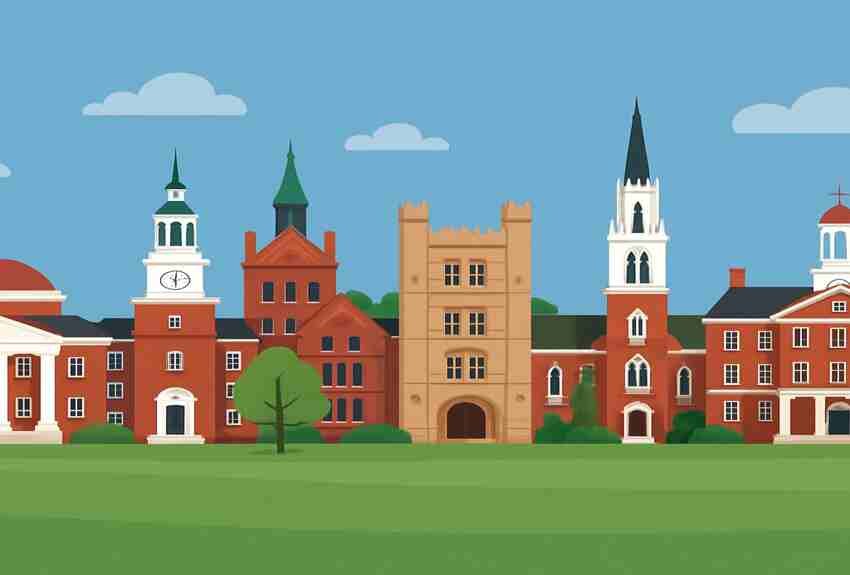
For students dreaming of elite education, Ivy League universities are often the top choice. Known for their academic excellence, distinguished alumni, and strong reputations, these schools are prestigious destinations for ambitious international students. But what exactly are the Ivy League schools, and what makes them so special? Let’s explore.
What is the Ivy League?
The Ivy League refers to a group of eight private universities in the United States. Originally formed as an athletic conference, the term now represents academic prestige and cultural significance. These universities offer top-notch education, world-class faculty, and unparalleled networking opportunities.
List of Ivy League Schools
Here are the eight Ivy League schools:
| University Name | Location | Founded | World Ranking (QS 2024) |
| Harvard University | Cambridge, Massachusetts | 1636 | #4 |
| Yale University | New Haven, Connecticut | 1701 | #11 |
| Princeton University | Princeton, New Jersey | 1746 | #9 |
| Columbia University | New York, New York | 1754 | #18 |
| University of Pennsylvania | Philadelphia, Pennsylvania | 1740 | #12 |
| Dartmouth College | Hanover, New Hampshire | 1769 | #190 |
| Brown University | Providence, Rhode Island | 1764 | #63 |
| Cornell University | Ithaca, New York | 1865 | #20 |
What Makes Ivy League Schools Unique?
- Academic Excellence
Ivy League universities are renowned for rigorous academics and cutting-edge research. They consistently rank among the best in the world. - Diverse Opportunities
From arts to sciences, these schools offer varied programs and resources, catering to all fields of study. - Elite Alumni Network
Graduating from an Ivy League school connects you with influential alumni across industries. - Financial Aid
These schools often offer generous scholarships, ensuring education is accessible regardless of financial background.
Advantages of Ivy League Schools
| Advantages | Details |
| Prestige | Globally recognized and respected institutions. |
| Exceptional Faculty | Taught by Nobel laureates and industry leaders. |
| Unmatched Resources | Libraries, labs, and facilities are world-class. |
| Global Connections | Opportunities to network with professionals worldwide. |
Challenges of Ivy League Schools
While Ivy League schools are attractive, they come with certain challenges:
- Competitive Admission Process
Acceptance rates are often below 10%, requiring strong academic and extracurricular achievements. - High Tuition Fees
Although scholarships are available, tuition can exceed $50,000 per year. - Intense Pressure
The rigorous academic environment may be overwhelming for some students.
Ivy League Rankings and Specializations
Each Ivy League university excels in specific fields:
| University | Known For |
| Harvard University | Business, Law, Medicine |
| Yale University | Arts, Drama, Political Science |
| Princeton University | Mathematics, Engineering, Economics |
| Columbia University | Journalism, Law, Finance |
| University of Pennsylvania | Business (Wharton School), Nursing |
| Dartmouth College | Liberal Arts, Business (Tuck School) |
| Brown University | Medicine, Public Health, Creative Writing |
| Cornell University | Agriculture, Hotel Management, Architecture |
How to Get into an Ivy League School?
- Strong Academics
Maintain an excellent GPA and standardized test scores (e.g., SAT or ACT). - Impressive Extracurriculars
Leadership roles and community involvement strengthen your application. - Write a Personal Statement
Share your story, passion, and how the university aligns with your goals. - Apply Early
Many Ivy League schools have early decision programs, which can increase admission chances.
Conclusion
The Ivy League schools are synonymous with excellence, offering unmatched education and opportunities. While getting in is challenging, the rewards—both personal and professional—are worth the effort. If you dream of studying at an Ivy League university, start preparing early and showcase your unique talents.
Your journey to an Ivy League education starts with determination and hard work. Are you ready to take the leap?
